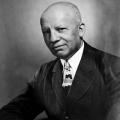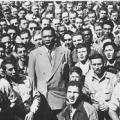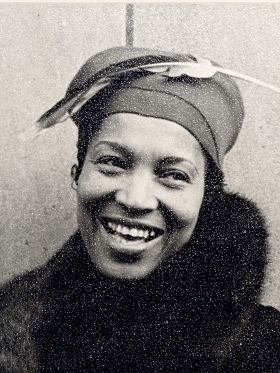82. The Florida Project: Zora Neale Hurston
Zora Neale Hurston’s interest in Africana folklore feeds into her great novel Their Eyes Were Watching God.
Themes:
• Z. Hurston, “Hoodoo in America,” Journal of American Folklore 44 (1931), 317-417.
• Z.N. Hurston, Mules and Men (New York: 1990, originally published 1935).
• C.A. Wall (ed.), Zora Neale Hurston: Novels and Stories (New York: 1995) [includes Their Eyes Were Watching God].
---
• M. Awkward (eds), New Essays on Their Eyes Were Watching God (Cambridge: 1990).
• V. Boyd, Wrapped in Rainbows: the Life of Zora Neale Hurston (London: 2003).
• C. Crabtree, “The Confluence of Folklore, Feminism and Black Self-Determination in Zora Neale Hurston’s Their Eyes Were Watching God,” Southern Literary Journal 17 (1985), 54-66.
• G.L. Cronin (ed.), Critical Essays on Zora Neale Hurston (New York: 1998).
• L. Diepeveen, “Folktales in the Harlem Renaissance,” American Literature 58 (1986), 64-81.
• H.L. Gates Jr and K.A. Appiah (eds), Zora Neale Hurston: Critical Perspectives Past and Present (New York: 1993).
• L.D. Jennings (ed.), Zora Neale Hurston, Haiti, and Their Eyes Were Watching God (Evanston: 2013).
• R.E. Hemenway, Zora Neale Hurston: a Literary Biography (Urbana: 1980).
• L. King, The Cambridge Introduction to Zora Neale Hurston (Cambridge: 2008).
• D.G. Plant, Every Tub Must Sit on Its Own Bottom: The Philosophy and Politics of Zora Neale Hurston (Urbana: 1995).
• L. Stewart, The Politics of Black Joy: Zora Neale Hurston and Neo-Abolitionism (Chicago: 2021).
• C.A. Wall, “Mules and Men and Women: Zora Neale Hurston’s Strategies of Narration and Visions of Female Empowerment,” Black American Literature Forum 23 (1989), 661-80.






Comments
Hurston and Spinoza
I listened to this episode shortly after finishing Hurston’s autobiography, which, at the end of chapter 15 includes a very Spinoza-lich assertion of herself as part of an infinite totality. She does not use any technical language and I took it as an independent “intuition”, sort of like Dolly Parton’s “Find out who you are and do it on purpose.” However, in her appendix (p.131 of my Kindle edition) she tells of a plan to “re-read Spinoza with love and care”; and I realized that , unlike Parton, Hurston would likely have encountered Spinoza while at Columbia and can legitimately be called Spinozist, if not “a Spinozist”. This, of course, is not a significant fact in the context of the Africana narrative, but you may want to note it when you get to the infamous atheist, as a sign of his continuing cultural relevance (banned in Boston, but never out of print since 1677). Do give my best to Hiawatha.
In reply to Hurston and Spinoza by Bill Meehan
Hurston and Spinoza
I agree with your assertions. I too have the Kindle version and found much of her reporting and analysis on Hoodoo and Voodoo supports that conclusion. Also, I recently finished an essay by Christopher Cameron, Ph.D., the University of North Carolina, titled "Zora Neale Hurston, Freethought, and African Religion," from the Journal of Africana Religions (Vol 4, No 2, 2016) where he says, "Hurston never articulated an atheist position, but her ideas about God and prayer show her to be a Deist." In my opinion, that is not beyond an arm's length away from being "Spinozist."
In reply to Hurston and Spinoza by Bill Meehan
Great point
Deborah G. Plant discusses Hurston's Spinozism in her book, listed in the further reading.
Add new comment